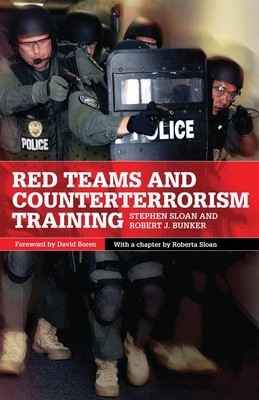
- We will send in 10–14 business days.
- Author: Stephen Sloan
- Publisher: University of Oklahoma Press
- ISBN-10: 0806141832
- ISBN-13: 9780806141831
- Format: 14 x 21.3 x 1.8 cm, softcover
- Language: English
- SAVE -10% with code: EXTRA
Reviews
Description
Using red teams in today's counterterrorism training Keeping ahead of terrorists requires innovative, up-to-date training. This follow-up to Stephen Sloan's pioneering 1981 book, Simulating Terrorism, takes stock of twenty-first-century terrorism-then equips readers to effectively counter it. Quickly canvassing the evolution of terrorism-and of counterterrorism efforts-over the past thirty years, co-authors Sloan and Robert J. Bunker draw on examples from the early 2000s, following the World Trade Center and Pentagon attacks, to emphasize the need to prevent or respond quickly to "active aggressors"-terrorists who announce their presence and seek credibility through killing. Training for such situations requires realistic simulations-whose effectiveness, the authors show, depends on incorporating red teams; that is, the groups that play the part of active aggressors. In Red Teams and Counterterrorism Training, Sloan and Bunker, developers of simulation-driven counterterrorist training, take readers through the prerequisites for and basic principles of conducting a successful simulation and preparing responders to face threats-whether from teenage shooters or from sophisticated terrorist organizations. The authors clearly explain how to create an effective red team whose members can operate from within the terrorists' mindset. An innovative chapter by theater professional Roberta Sloan demonstrates how to use dramatic techniques to teach red teams believable role-playing. Rounding out this book, a case study of the 2009 shooting at Fort Hood illustrates the cost of failures in intelligence and underscores the still-current need for serious attention to potential threats. First responders-whether civilian or military-will find Red Teams and Counterterrorism Training indispensible as they address and deter terrorism now and in the futur Stephen Sloan A pioneer in terrorism research and education, Stephen Sloan is the author of fourteen books, including Simulating Terrorism and Terrorism: The Present Threat in Context. Robert J. Bunker, an expert on unconventional security threats, is the editor of numerous books, including Networks, Terrorism, and Global Insurgency. Roberta Sloan is an actor and director and Professor of Theater at Temple University, where she is also Head of Theater Education. David L. Boren Rhodes Scholar David Boren, currently President of the University of Oklahoma, was the longest-serving chairman of the U.S. Senate Intelligence Committee.
EXTRA 10 % discount with code: EXTRA
The promotion ends in 19d.16:30:19
The discount code is valid when purchasing from 10 €. Discounts do not stack.
- Author: Stephen Sloan
- Publisher: University of Oklahoma Press
- ISBN-10: 0806141832
- ISBN-13: 9780806141831
- Format: 14 x 21.3 x 1.8 cm, softcover
- Language: English English
Using red teams in today's counterterrorism training Keeping ahead of terrorists requires innovative, up-to-date training. This follow-up to Stephen Sloan's pioneering 1981 book, Simulating Terrorism, takes stock of twenty-first-century terrorism-then equips readers to effectively counter it. Quickly canvassing the evolution of terrorism-and of counterterrorism efforts-over the past thirty years, co-authors Sloan and Robert J. Bunker draw on examples from the early 2000s, following the World Trade Center and Pentagon attacks, to emphasize the need to prevent or respond quickly to "active aggressors"-terrorists who announce their presence and seek credibility through killing. Training for such situations requires realistic simulations-whose effectiveness, the authors show, depends on incorporating red teams; that is, the groups that play the part of active aggressors. In Red Teams and Counterterrorism Training, Sloan and Bunker, developers of simulation-driven counterterrorist training, take readers through the prerequisites for and basic principles of conducting a successful simulation and preparing responders to face threats-whether from teenage shooters or from sophisticated terrorist organizations. The authors clearly explain how to create an effective red team whose members can operate from within the terrorists' mindset. An innovative chapter by theater professional Roberta Sloan demonstrates how to use dramatic techniques to teach red teams believable role-playing. Rounding out this book, a case study of the 2009 shooting at Fort Hood illustrates the cost of failures in intelligence and underscores the still-current need for serious attention to potential threats. First responders-whether civilian or military-will find Red Teams and Counterterrorism Training indispensible as they address and deter terrorism now and in the futur Stephen Sloan A pioneer in terrorism research and education, Stephen Sloan is the author of fourteen books, including Simulating Terrorism and Terrorism: The Present Threat in Context. Robert J. Bunker, an expert on unconventional security threats, is the editor of numerous books, including Networks, Terrorism, and Global Insurgency. Roberta Sloan is an actor and director and Professor of Theater at Temple University, where she is also Head of Theater Education. David L. Boren Rhodes Scholar David Boren, currently President of the University of Oklahoma, was the longest-serving chairman of the U.S. Senate Intelligence Committee.


Reviews